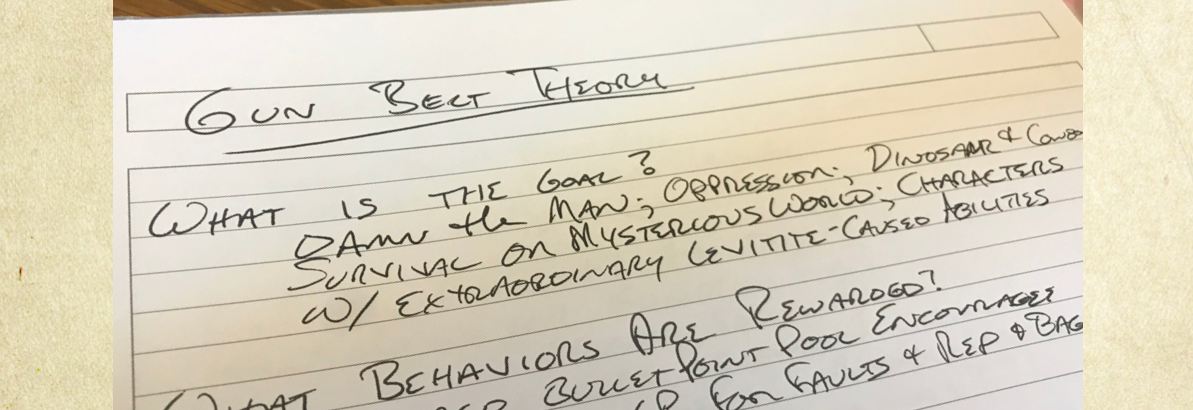Ryan has been developing a tabletop roleplaying game, The Gun Belt for over three years. The game features alien and robot cowboys riding dinosaurs in an interstellar Wild West on a world with no wheels. It is currently in the process of playtesting. This blog explores the process he and his design partner, Ashley, have experienced during that time.

What is my game about?
It seems like it should be such a simple question, but it really isn't. It is, however, one of the most important questions.
In screenwriting classes in college, they would ask the same question of us as student writers. What is your script about? "Oh, it's about two teenagers who stumble on a group of aliens who are secretly plotting to take over the world and have to stop it on their own." No. That's the plot. But that's not what it's about.
Maybe it's about teenagers struggling with who they are and what they are capable of. It could be about young people dealing with unwanted empowerment against an unstoppable foe. It's about teenagers understanding the importance of believing in themselves when no one else can. Perhaps it's even as simple as, "It's about faith in one's self."
Your roleplaying game has a similar answer and you need to know it.
Game designers Jared Sorensen, Luke Crane and John Wick are famous for talking about the Three Questions of Game Design (Wick believes it's Four Questions, and I agree with him). I highly encourage you to search the web for their writings and video lectures on this topic if you've never done so. The questions are simple, but also surprisingly deep, complex and unavoidably important for you as a game developer to know:
- What is your game about?
- How is your game about that?
- What behaviors does your game reward?
- Why is that fun?
Here's a quick breakdown.
Determining what your game is actually about will help you to better focus your theme and the feel of your world. It will keep your ideas always pointed to the center and will help keep you from getting too far away from your design goals. The answer is especially helpful when you have two conflicting ideas that you are undecided about because typically one of those ideas will be more suited to what your game is about than the other.
Figuring out how your game is about that will enable you to keep your mechanics on point. This will help you to be certain that your mechanics relate to what your game is about in a direct way that helps to enforce the themes you want to explore. For example, if you decide that your game is about the struggle to hold on to your humanity (I'm looking at you, vampire games), then your game better have a Humanity mechanic.
Rewarding the behaviors you want your players to have is incredibly important. If you want your players to roleplay in a way that enables them to explore what your game is about, then you have to make sure that they are rewarded when they do so. This will keep them focused on your central theme as they play. If your game is about something, then you want to do everything you can to keep your players invested in what it's about.
Finally, no one wants to play something that isn't fun. Some designers believe that if you capture the first three questions properly, the fourth question should answer itself. I think there's no harm in checking to make sure. Look at what your game is about, how it does it and what it rewards, and then simply examine if those things are all coming together in a way that is fun.
Let's be really classic in quickly explaining all this together. We'll use Dungeons & Dragons to do it. D&D is about experiencing a fantasy hero's adventure. It does this by structuring adventurous scenarios in a fantasy setting featuring dangerous encounters and combat simulation mechanics. The game rewards the behaviors it wants you to experience by (guess what!?!?) rewarding Experience – It wants you to slay the dragon and get the treasure so it gives you XP for the dragon and may even award you gold and magical items when you loot its lair. This is fun because, well, you killed a dragon in a battle simulated on a huge map on your kitchen table using strategy, cunning and the gambling sensation of dice.
The Gun Belt is about group survival on a mysterious oppressed planet. Characters are all born on Weston – second or third-generation inhabitants who exist outside the systemic treachery of LeviCorp and have mystic powers caused by the unusual mineral scattered across the world. The mechanics reward the party for working together through the shared Bullet Dice pool, as well as awarding experience points for roleplaying Faults and Reputation. It's fun because people enjoy sticking it to The Man and because cowboys on dinosaurs speaks to childhood fantasy and wonder.
What is your game about?
